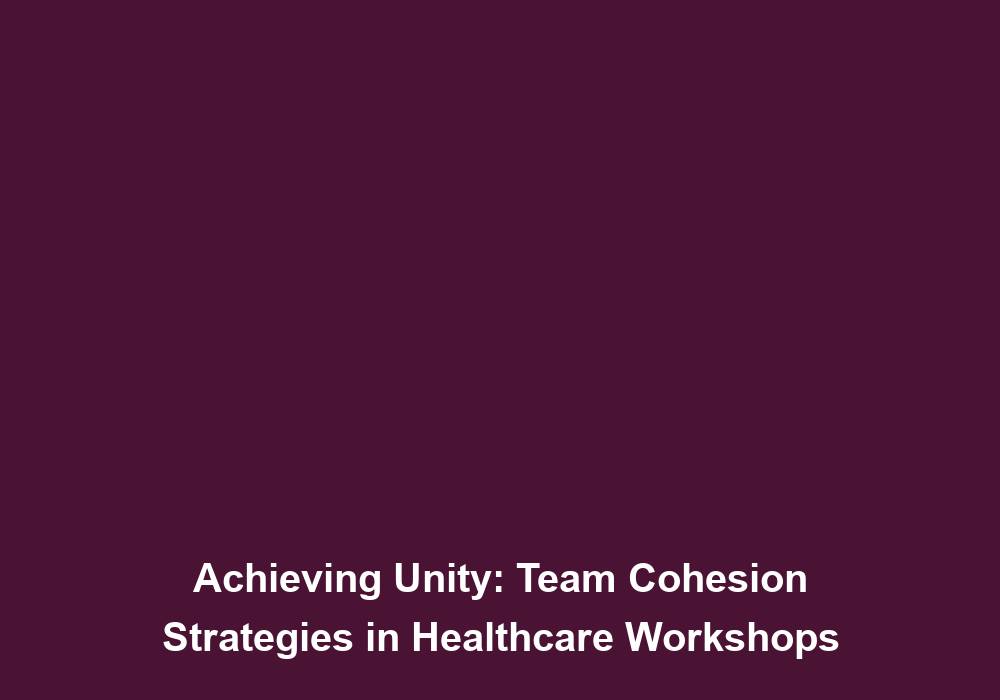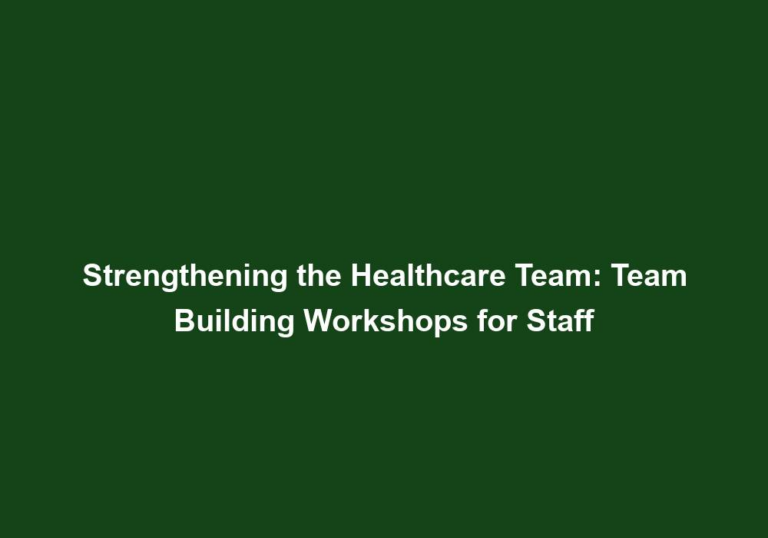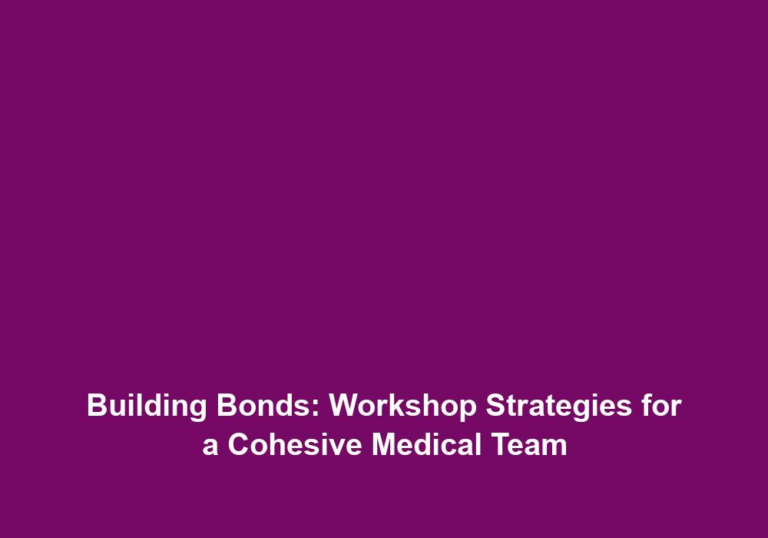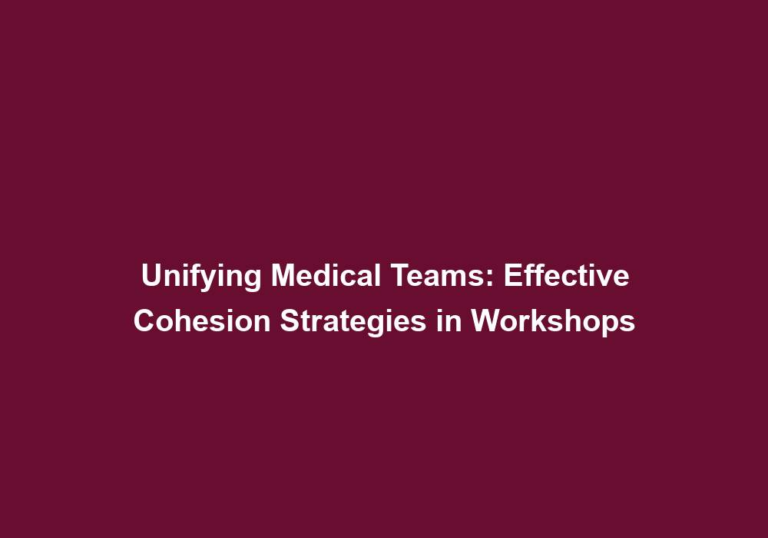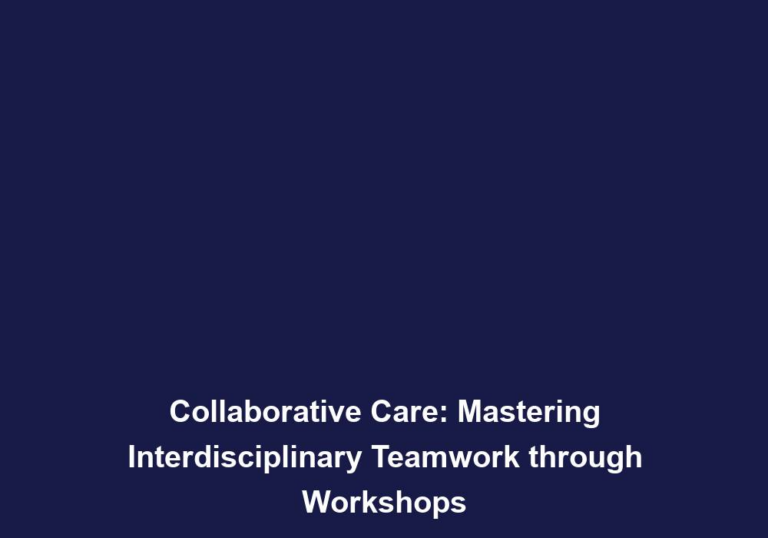Achieving Unity: Team Cohesion Strategies in Healthcare Workshops
In today’s fast-paced healthcare industry, effective teamwork and collaboration are crucial for providing high-quality patient care. Healthcare workshops play a vital role in fostering team cohesion and unity among healthcare professionals. By implementing various strategies and techniques, these workshops can promote a collaborative and harmonious work environment, leading to enhanced patient outcomes. In this article, we will explore some effective team cohesion strategies that can be implemented during healthcare workshops.
1. Establishing Clear Goals and Objectives
Setting clear goals and objectives is the first step in achieving team cohesion during healthcare workshops. Clearly defining the purpose of the workshop, the desired outcomes, and the specific objectives to be accomplished will provide a focused direction for all participants. This clarity helps align everyone’s efforts towards a common goal, ensuring that the workshop becomes a more cohesive and productive experience.
To expand on this, consider the following:
- Create a comprehensive agenda that outlines the specific goals and objectives of the workshop.
- Break down larger goals into smaller, achievable milestones to provide a sense of progress and accomplishment.
- Communicate the goals and objectives clearly to all participants before the workshop begins to ensure everyone is on the same page.
2. Encouraging Active Participation
Active participation from all workshop attendees is essential for fostering team cohesion. Encourage participants to contribute their thoughts, ideas, and experiences throughout the workshop. By valuing each individual’s input and actively engaging everyone in discussions and activities, you create an inclusive and collaborative environment where all team members feel heard and valued.
To emphasize active participation, consider the following:
- Create opportunities for group discussions and brainstorming sessions where all participants can share their perspectives.
- Encourage participants to ask questions, challenge ideas, and provide constructive feedback to promote critical thinking and collaboration.
- Incorporate interactive activities, such as role-playing or case studies, that require active engagement and participation from all team members.
3. Promoting Effective Communication
Effective communication is a cornerstone of successful teamwork. During healthcare workshops, it is important to emphasize the importance of open and transparent communication among team members. Encourage active listening, respectful dialogue, and constructive feedback. By promoting effective communication, you create an environment where ideas can be shared, conflicts can be resolved, and trust can be built among team members.
To promote effective communication, consider the following:
- Provide communication guidelines or ground rules at the beginning of the workshop to set expectations for respectful and constructive dialogue.
- Encourage active listening by implementing techniques such as paraphrasing or summarizing others’ ideas to ensure understanding.
- Foster a safe space for feedback by emphasizing the importance of constructive criticism and providing opportunities for anonymous feedback if necessary.
4. Facilitating Team-Building Activities
Team-building activities are a powerful tool for fostering team cohesion and unity. These activities help team members get to know each other on a personal level, build trust, and develop effective working relationships. Consider incorporating team-building exercises, such as icebreakers, problem-solving activities, or even outdoor challenges, into your healthcare workshops. These activities not only promote teamwork but also create a positive and enjoyable atmosphere.
To facilitate team-building activities, consider the following:
- Plan icebreaker activities at the beginning of the workshop to help participants feel more comfortable and connected.
- Incorporate problem-solving activities that require collaboration and cooperation to strengthen teamwork skills.
- Organize team-building activities outside of the workshop environment, such as team lunches or social events, to foster informal interactions and build camaraderie.
5. Encouraging Diversity and Inclusion
Diversity and inclusion are essential for achieving unity within a healthcare team. Encourage participants from diverse backgrounds, roles, and experiences to attend the workshop. By valuing and embracing diversity, you create an environment where different perspectives are appreciated, and innovative solutions can be developed. Ensure that all participants feel included and respected, regardless of their background or position within the healthcare team.
To encourage diversity and inclusion, consider the following:
- Promote diversity in workshop invitations and ensure representation from various departments, roles, and levels of experience.
- Create opportunities for participants to share their unique perspectives and experiences during discussions and activities.
- Foster an inclusive environment by actively addressing biases, promoting equal participation, and respecting differences among team members.
6. Providing Opportunities for Skill Development
Healthcare workshops provide an excellent platform for skill development and professional growth. By offering opportunities to learn new skills, enhance existing knowledge, and share best practices, you empower team members to excel in their roles. Consider incorporating educational sessions, hands-on training, and interactive workshops into your healthcare workshop agenda. This not only enhances team cohesion but also contributes to the overall competency and effectiveness of the healthcare team.
To provide opportunities for skill development, consider the following:
- Identify relevant training topics based on the needs and interests of the workshop participants.
- Include interactive workshops or simulations that allow participants to practice and apply new skills in a safe and supportive environment.
- Encourage knowledge sharing among team members by providing platforms for presenting case studies, research findings, or innovative ideas.
7. Recognizing and Celebrating Achievements
Recognition and celebration of achievements are vital for maintaining team morale and motivation. During healthcare workshops, take the time to acknowledge and appreciate the efforts and accomplishments of individual team members and the team as a whole. Celebrate milestones, successful projects, and improvements in patient outcomes. By recognizing and celebrating achievements, you reinforce a positive and supportive team culture, which ultimately contributes to team cohesion.
To recognize and celebrate achievements, consider the following:
- Publicly acknowledge individual and team accomplishments during the workshop, such as through verbal recognition or certificates of appreciation.
- Create a culture of gratitude by encouraging participants to express their appreciation for one another’s contributions.
- Incorporate celebratory activities, such as team-building games or small rewards, to make the workshop experience more enjoyable and rewarding.
Conclusion
Achieving unity and team cohesion in healthcare workshops is essential for fostering a collaborative and harmonious work environment. By implementing strategies such as establishing clear goals, encouraging active participation, promoting effective communication, facilitating team-building activities, encouraging diversity and inclusion, providing skill development opportunities, and recognizing achievements, healthcare professionals can enhance teamwork and ultimately improve patient care outcomes. Embrace these strategies and create impactful healthcare workshops that truly unite and empower your team.

